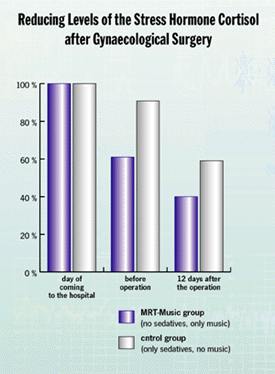Under investigation were 28 women who received a fibromyom surgery on the uterus. Coming into the hospital the level of cortisol varied between 840 and 1400 nmol / l (on average 995), thus being very high as can be seen in the chart.
Medical Resonance Therapy Music®
Group
14 women were treated with Medical Resonance Therapy Music® 2-3 times before surgery and for twelve days after surgery, 1-2 times per day, each time for 30-60 minutes in addition to a conventional treatment with antibiotics, vitamin preparations, anodynes and a disintoxication therapy as well as a physiotherapy.
In difference to the control group these women did not receive sedative drugs before and after surgery.
Before surgery
By treating the women before operation with Medical Resonance Therapy Music® cortisol level sank by 39% – more than four times as much as in the medication group.
After surgery
At the end of the postoperative treatment, which means at the 10th-12th day, the cortisol content in blood was reduced by factor 2,4 (60%), in the control group this factor was 1,7 (41%) compared to the initial level.
Control Group14 women were treated with Medical Resonance Therapy Music® 2-3 times before surgery and for twelve days after surgery, 1-2 times per day, each time for 30-60 minutes in addition to a conventional treatment with antibiotics, vitamin preparations, anodynes and a disintoxication therapy as well as a physiotherapy.
In difference to the control group these women did not receive sedative drugs before and after surgery.
Before surgery
By treating the women before operation with Medical Resonance Therapy Music® cortisol level sank by 39% – more than four times as much as in the medication group.
After surgery
At the end of the postoperative treatment, which means at the 10th-12th day, the cortisol content in blood was reduced by factor 2,4 (60%), in the control group this factor was 1,7 (41%) compared to the initial level.
In this group 14 women received the conventional treatment only, not listening to Medical Resonance Therapy Music®. Before surgery they received sedative drugs and after surgery they received the conventional treatment. In difference to the experimental group the women here were treated also with sedative drugs after surgery in order to treat their sleep disorders.
Before surgery
The treatment with the conventional sedative drugs lowered the cortisol level too, but only by 9,2%.
After surgery
At the end of the postoperative treatment, which means at the 10th-12th day, the cortisol content in blood was reduced by factor 1,7 (41%) compared to the initial level.
Investigators:
Prof. Dr. med. G. Gerassimowitsch
Prof. Dr. med. Walentina Sidorenko
Dr. med. Anna Kuptschina
Dr. med. Tatjana Teterkina
Dr. med. Sergej Korotkow
